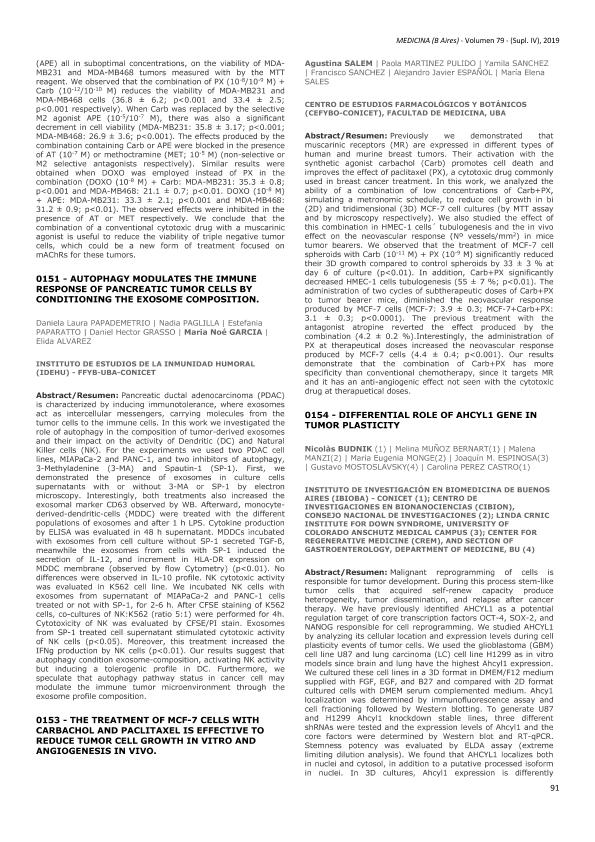Evento
Autophagy modulates the immune response of pancreatic tumor cells by conditioning the exosome composition
Papademetrio, Daniela Laura ; Paglilla, Nadia; Paparatto, Estefania Silvia; Grasso, Daniel Hector
; Paglilla, Nadia; Paparatto, Estefania Silvia; Grasso, Daniel Hector ; Garcia, Maria Noe
; Garcia, Maria Noe ; Alvarez, Elida Ester
; Alvarez, Elida Ester
 ; Paglilla, Nadia; Paparatto, Estefania Silvia; Grasso, Daniel Hector
; Paglilla, Nadia; Paparatto, Estefania Silvia; Grasso, Daniel Hector ; Garcia, Maria Noe
; Garcia, Maria Noe ; Alvarez, Elida Ester
; Alvarez, Elida Ester
Tipo del evento:
Reunión
Nombre del evento:
LXIV Reunión Anual de la Sociedad Argentina de Investigación Clínica; LI Reunión Anual de la Asociación Argentina de Farmacología Experimental; XXI Reunión Anual de la Sociedad Argentina de Biología; XXXI Reunión Anual de la Sociedad Argentina de Protozoología y IX Reunión Anual de la Asociación Argentina de Nanomedicinas
Fecha del evento:
13/11/2019
Institución Organizadora:
Sociedad Argentina de Investigación Clínica;
Asociación Argentina de Farmacología Experimental;
Sociedad Argentina de Biología;
Sociedad Argentina de Protozoología;
Asociación Argentina de Nanomedicinas;
Asociación Argentina de Ciencia y Tecnología de Animales de Laboratorio;
Título de la revista:
Medicina (Buenos Aires)
Editorial:
Fundación Revista Medicina
Idioma:
Inglés
Clasificación temática:
Resumen
Pancreatic ductal adenocarcinoma (PDAC) is characterized by inducing immunotolerance, where exosomes act as intercellular messengers, carrying molecules from the tumor cells to the immune cells. In this work we investigated the role of autophagy in the composition of tumor-derived exosomes and their impact on the activity of Dendritic (DC) and Natural Killer cells (NK).For the experiments we used two PDAC cell lines, MIAPaCa-2 and PANC-1, and two inhibitors of autophagy, 3-Methyladenine (3-MA) and Spautin-1 (SP-1). First, we demonstrated the presence of exosomes in culture cells supernatants with or without 3-MA or SP-1 by electron microscopy. Interestingly, both treatments also increased the exosomal marker CD63 observed by WB. Afterward, Monocyte-Derived-Dendritic-Cells (MDDC) were treated with the different populations of exosomes and after 1h LPS. Cytokine production by ELISA was evaluated in 48h supernatant. MDDCs incubated with exosomes from cell culture without SP-1 secreted TGF-β, meanwhile the exosomes from cells with SP-1 induced the secretion of IL-12, and increment in HLA-DR expression on MDDC membrane (observed by flow Cytometry) (p<0.01). No differences were observed in IL-10 profile. NK cytotoxic activity was evaluated in K562 cell line. We incubated NK cells with exosomes from supernatant of MIAPaCa-2 and PANC-1 cells treated or not with SP-1, for 2-6h. After CFSE staining of K562 cells, co-cultures of NK:K562 (ratio 5:1) were performed for 4h. Cytotoxicity of NK was evaluated by CFSE/PI stain. Exosomes from SP-1 treated cell supernatant stimulated cytotoxic activity of NK cells (p<0.05). Moreover, this treatment increased the IFNγ production by NK cells (p<0.01).Our results suggest that autophagy condition exosome-composition, activating NK activity but inducing a tolerogenic profile in DC. Furthermore, we speculate that autophagy pathway status in cancer cell may modulate the immune tumor microenvironment through the exosome profile composition.
Palabras clave:
PANCREATIC CANCER
,
EXOSOMES
,
AUTOPHAGY
,
NATURAL KILLERS
Archivos asociados
Licencia
Identificadores
Colecciones
Eventos(IDEHU)
Eventos de INST.DE EST.DE LA INMUNIDAD HUMORAL PROF.R.A.MARGNI
Eventos de INST.DE EST.DE LA INMUNIDAD HUMORAL PROF.R.A.MARGNI
Citación
Autophagy modulates the immune response of pancreatic tumor cells by conditioning the exosome composition; LXIV Reunión Anual de la Sociedad Argentina de Investigación Clínica; LI Reunión Anual de la Asociación Argentina de Farmacología Experimental; XXI Reunión Anual de la Sociedad Argentina de Biología; XXXI Reunión Anual de la Sociedad Argentina de Protozoología y IX Reunión Anual de la Asociación Argentina de Nanomedicinas; Mar del Plata; Argentina; 2019; 91-91
Compartir



